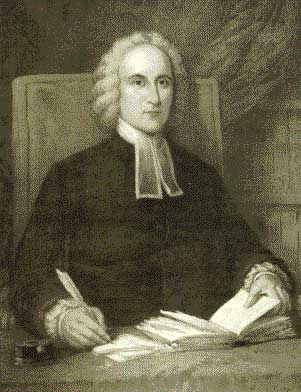|
Jonathan Edwards (October 5, 1703 - March 22, 1758)
Jonathan Edwards was a colonial Congregational preacher,
theologian, and missionary to Native Americans. Edwards is
widely acknowledged to be America's most important and original
philosophical theologian," and one of America's greatest
intellectuals. His resolutions were written early in life and guided him throughout. |  |
Edwards' theological work is very broad in scope, but he is often associated with his defence of Reformed theology, the metaphysics of theological determinism, and the Puritan heritage. Edwards played a critical role in shaping the First Great Awakening, and oversaw some of the first fires of revival in 1733-1735 at his church in Northampton, Massachusetts.
Edwards' sermon "Sinners in the Hands of an Angry God," is considered a classic of early American literature, which he delivered during another wave of revival in 1741, following George Whitefield's tour of the Thirteen Colonies
Edwards is widely known for his many books: The End For Which God Created the World; The Life of David Brainerd, which served to inspire thousands of missionaries throughout the nineteenth century; and Religious Affections, which many Reformed Evangelicals read even today. Edwards died from a smallpox inoculation shortly after beginning the presidency at the College of New Jersey (later to be named Princeton University).
Jonathan Edwards, born on October 5, 1703, was the son of Timothy Edwards (1668-1759), a minister at East Windsor, Connecticut (modern day South Windsor) who eked out his salary by tutoring boys for college. His mother, Esther Stoddard, daughter of the Rev. Solomon Stoddard, of Northampton, Massachusetts, seems to have been a woman of unusual mental gifts and independence of character.
